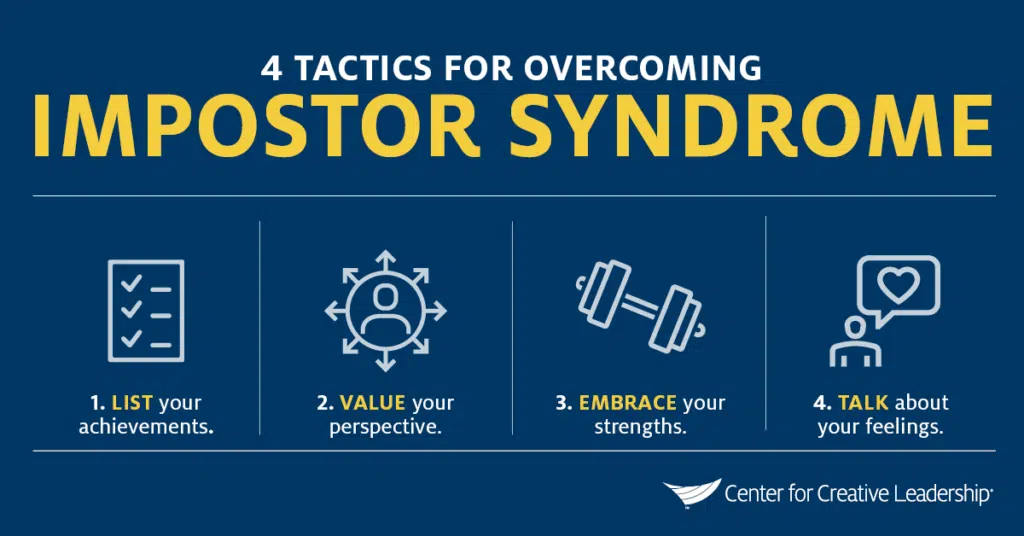Do you ever feel like you’re not worthy of the success you’ve achieved?
Or that you’re faking it in your career and just waiting for someone to discover that you’re a sham?
Chances are you’re suffering from impostor syndrome. And you’re not alone. Suffering from impostor syndrome is surprisingly common.
The authors of our guidebook Beating the Impostor Syndrome estimate that about 2 in 3 of the executives they’ve coached struggle with it. These executives reported feeling that they haven’t earned their accomplishments or somehow faked their way to success.
Why Is Overcoming Impostor Syndrome Important?
Self-doubt is really the seed of impostor syndrome, where you fail to recognize your capabilities, even in light of clear evidence to the contrary. You worry whether someone will find out that you’re here by mistake, and you focus on the qualifications others hold that you supposedly lack.
Beyond making you feel terrible, impostor syndrome can limit your career and personal growth. It can lead to burnout, emotional exhaustion, loss of intrinsic motivation, and poor achievement. It also causes stress, fear, anxiety, and loss of confidence. It can knock careers off-track and also harm team morale and organizational performance through micromanagement, slow decision-making, and perfectionism.
The problem is sometimes more common among women and minorities within the workforce. But anybody can fall victim to it.
But how can you shift from feeling inadequate to feeling powerful? How can you overcome impostor syndrome?
How to Overcome Impostor Syndrome
The good news is there are some simple steps you can take right away to build your confidence and overcome impostor syndrome.
By incorporating these 4 behaviors into your routine, you should have a more defined sense of the value and experience you bring to each exchange in the workplace. These tactics can help you start to own your success and stop feeling like a fraud:
4 Tactics to Build Confidence
1. Focus on the facts.
List your achievements and objectively assess the skills, capabilities, and qualities that helped you succeed thus far. Allow yourself to feel proud of your accomplishments. Consciously avoid giving “luck” credit for your success.
2. Challenge limiting beliefs.
Examine your deep-seated beliefs about the criteria for success. Then look for facts or examples to test whether these criteria are actually valid, and how they might hold you back. Recognize the valuable perspective you’ve gained from personal hardships you’ve faced.
3. Claim your strength.
Instead of focusing on your weaknesses, embrace your assets, and reflect on how to leverage them more fully. Advocate for yourself and own your strengths. Don’t shy away from some authentic self-promotion.
4. Talk about it.
Share your feelings with trusted friends, colleagues, a mentor, or an executive coach to put them in perspective and help you reinforce the positive changes you are making. Then, move on. Avoid rumination, which just creates stress, or letting yourself dwell.
Find more insights on how to overcome impostor syndrome and redefine success in our book Kick Some Glass: 10 Ways Women Succeed at Work on Their Own Terms.
Another Key to Overcoming Impostor Syndrome: Building a Network
If you’re still struggling to recognize your value and overcome impostor syndrome after embracing these practices, it might be time to consider a shift in role, organization, or work style.
Whether the next step involves a difficult conversation with your employer or taking the leap to start working for yourself, a healthy dose of self-confidence is required.
And if you feel like you’re going out on a limb to build a robust professional network, you may also want to work on strengthening your network, although networking has been challenging during the recent coronavirus pandemic.
Many people, especially women leaders, find themselves viewing “networking” in a negative light. But networking can help you take your career to the next level or build a supportive community of people facing similar dilemmas. If this is a struggle for you, check out our networking tips for women.
And having a mentor or sponsor can also help you overcome impostor syndrome. You need a network of champions to help you advance in your career, so look at who you can enlist to help out, and who you can help. We often grow as people through the relationships we form, so realize that what you have to offer — while it may be hard to see sometimes — will likely help others develop as well.
Whether you’re ready for a change, or just need some new perspective on your current role as you try to overcome impostor syndrome, Kick Some Glass offers reassurance: “You are more ready than you know. You have more talent than you may recognize … trust yourself. Trust that all you have done before will serve you well. Trust that you are ready.”
Ready to Take the Next Step?
Our leadership programs can help boost self-awareness and confidence in individuals who are struggling to overcome impostor syndrome and self-doubt. And organizations can do more to retain and advance their talented women leaders by partnering with us for women’s leadership development.








